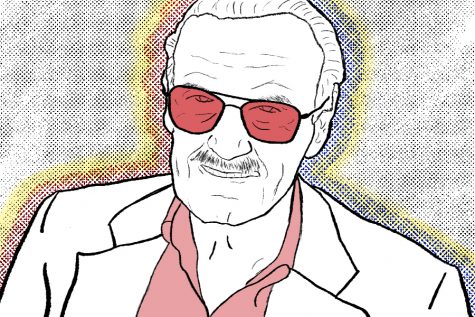Stan Lee left a world in need of the heroes he created
November 14, 2018

Famed Marvel Comics editor Stan Lee died on Nov. 13, leaving behind both a daughter and a transformative impact in the comic book industry. Bringing to life such characters as Spider-Man, the Fantastic Four, Iron Man and the Hulk, Lee’s work both entertained and inspired, laying the foundation for today’s comic book zeitgeist in the stories he helped pen. Portraying the human spirit triumphant, Lee’s legacy lies in the boundless humanity he infused into his characters.
Born Stan Lieber, the son of Romanian Jewish immigrants, Lee began working at Timely Comics as a 16 year old. Adopting the moniker “Lee” out of embarrassment, he rose through the ranks in the comic book industry, initially writing stories which satisfied the unserious nature of the genre.
In 1961, Lee began transforming the industry. With the help of fellow industry pioneer Jack Kirby, Lee created “The Fantastic Four.” This bold new series depicted a fallible superhuman family, breaking away from decades of flawless superheros. Lee built on his success by collaborating with others to create characters like the alcoholic Iron-Man, the chronically tormented Hulk and, most famously, the gangly, geeky Spider-Man.
In these characters, Lee transcended the simply fantastical elements which once defined the comic book genre. Instead, he gave voice to the dreams, fears and hopes felt by all, just within a supernatural context. In the X-Men, for instance, he and Kirby, at the height of the civil rights movement, depicted the dehumanization of minorities. Lee and Marvel portrayed the ongoing struggle of the stigmatized to survive amidst the hatred and suspicion of others.
Similarly, Lee created the blind superhero Daredevil, who is perhaps the most iconic representation of people with visual impairments across any creative medium. Lee’s stories may have been supernatural, but the characters remained unquestionably human.
The recent commercial successes of Lee’s various creations, most notably in the Marvel Cinematic Universe, have demonstrated their enduring popular appeal. This, however, is far from his greatest achievement. He revolutionized the storytelling potential of the comic book, revealing that neither the medium nor the setting mattered much in telling resonant tales.
In speaking of Lee’s accomplishments, it would be remiss to ignore the various allegations of sexual harassment levied against him by various nurses. These accusations suggest a callous disregard for others and render him less deserving of either our respect or reverence.
In the characters he created, however, the respect for others missing in his personal life lives on. Writing for The Atlantic in 2007, he spoke of the numerous challenges facing our nation, challenges which have only intensified in the following years.
In the face of these national struggles, it is tempting to seek solace within the comfortable confines of our individual enclaves. Lee’s creations, however, admonish us to not seek an escape from the world’s woes but to confront them first. With the great power and privilege many of us enjoy comes a commensurate responsibility, one which binds us in service to our fellow human beings, though perhaps with less spandex.
Ultimately, the appeal of these characters lies not in their origins, skill sets or even extravagant plots. Instead, in their perpetual battles to do good in the face of personal failures and external obstacles, they encourage us always to strive to be more, to do more, and to aspire toward a better world amidst insurmountable odds. In other words, they show us what it means to be a superhero. ‘Nuff said.









Leave a Comment